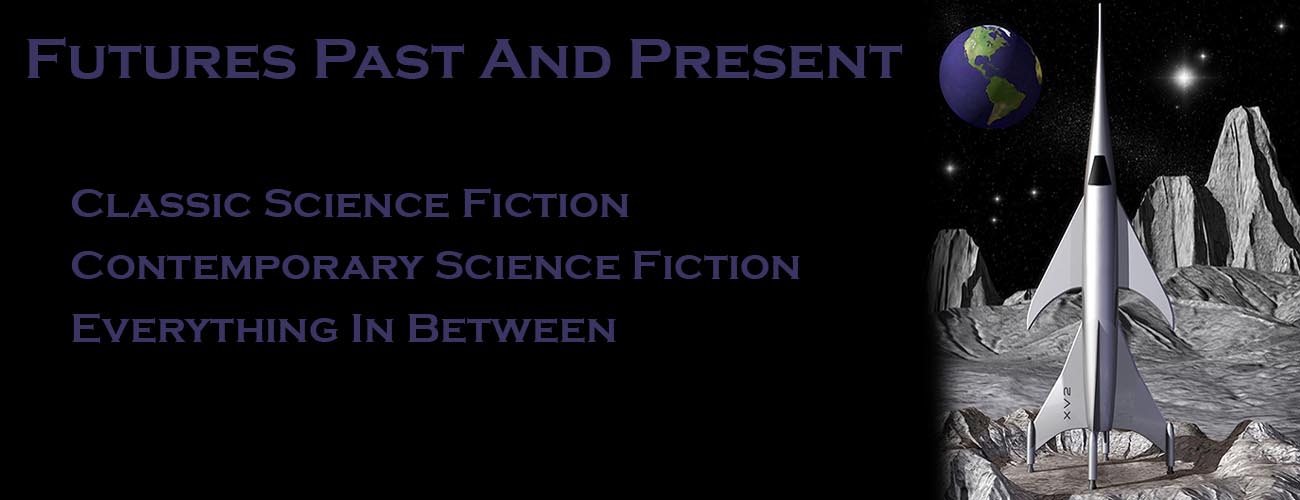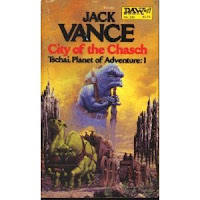He will be missed. Our thoughts and prayers are with his wife Kate.
Author Archives: Keith West
Further Adventures on the Planet of Adventure: Jack Vance’s Servants of the Wankh
Servants of the Wankh
Tschai: Planet of Adventure 2
Jack Vance
In the second installment of the Planet of Adventure series, Adam Reith and his companions Traz Onmale and the Dirdirman Anacho set out to return the Flower of Cath to her homeland and while there receive help in building a spaceship to return home. Due to a convoluted standard of shame that I’m not sure I ever completely understood, she ends up jumping overboard during the voyage.
Much of the first book was a sword and planet adventure. It may have been because I was constantly being interrupted while reading Servants over a period of days, rather than finishing it in a single day, but it seemed to me that this was more an adventure of wit and manners.
Don’t get me wrong, there’s plenty of adventure. Our hero is stranded on the Planet of Adventure, after all. Much of the conflict was cultural rather than physical, with wit and cunning being two of the weapons employed. That’s especially true after they reach Cath.
While in Cath, a contract is taken out on Adam Reith with a guild of assassins. Instead of simply letting the assassin do his job, Reith resists. One of the companions he’s picked up helps, resulting in a scolding from a woman passing by. Seems they were interfering in the assassin’s making a living. The result of all this is a nasty letter and a fine being levied against Reith by the guild. (The contract had been cancelled by this point.)
It’s this type of humor, looking at different cultures and the strange rules they have, that makes a Jack Vance book such a fun thing to read. If you haven’t experienced it, you owe it to yourself to do so.
Receiving no help in Cath, Reith and friends decide to steal a starship from the Wankh, one of the most unfortunate choices of a name for a race in all of science fiction. I doubt I will be spoiling much if I told you they aren’t successful. That would make the two remaining books in the series sort of pointless, wouldn’t it.
In spite of the fact that it took me way too long to finish this one, it’s not a long book. The DAW edition is only 157 pages long. There was an earlier edition from Ace, but I don’t know how many pages it had. And it’s too late and I’m too tired to look it up. My point is that this is a short novel and a good way to while away a lazy afternoon or evening.
Finally, A Voice of Reason
The Jetsons and Modern Technology
They Don’t Write ’em Like That Anymore: Jack Vance’s City of the Chasch
The Death of a Dream and the Need for Manifest Destiny
Dr. Jerry Pournelle
Tomorrow, as I write these words, and earlier today, as I post them (thank you software glitches for the delay), the last Space Shuttle, Atlantis, will land for the final time. And then, for all practical purposes, it will be over.
Yes, I know we’ll still have an astronaut corps. They will still fly, on other nation’s launch systems, to the International Space Station. At least until it’s deorbited in a few years. But we won’t have the capability to send our people into space. We’ll simply be hitching rides on some else’s rockets. Like other countries used to do on ours. We will no longer be the wold’s leader in manned space exploration.
The government, through NASA, originally said that a replacement launch vehicle will be built and are continuing to say that. Let’s ignore for a moment that retiring your launch vehicles without having a replacement is akin to quitting your job without finding a new one or selling your car when you haven’t bought a replacement and are a few hundred miles from home, shall we? These are the same people who have been promising for decades to balance the federal budget and reduce the national debt. Given the negative progress they’ve made, I’m not holding out hope for a replacement vehicle from the government. Especially since our leerless feeder fearless leader last week said that it was time for private industry “to capture the flag.”
That’s almost certainly the only way we’ll ever get back into space. Through private industry. Our government won’t do it. The Chinese might. The Russians will probably keep something going not only to service the Station, but as a matter of pride. “The Americans beat us to the Moon, but we’re still in space while they’ve quit and gone home.”
If our government wants to implement a real stimulus package, perhaps our elected officials might like to consider this little fact: For every dollar spent on the space program, the government has received approximately $7 back in corporate and personal income tax due to the development of spinoff technology. For that type of increase in taxes, there would have to be more money circulating in the economy. There are several websites that list some of the things we enjoy today that came out of research and development in our space program. For starters try this one, and this one, and this one.
I know that we’ll send probes on various missions. At least for a while. And I know all the arguments for using robots and unmanned probes rather than people. And to a point, they’re valid. But there are some things robots can’t do. Do we quit when we get to the point that we’ve done all we can with robots? Or do we keep going?
There’s something in the human spirit that needs frontiers. Well, the healthy human spirit anyway. That’s why as a species, we’ve always been explorers.
Just the opposite in fact. We have only a limited amount of resources here. There are plenty of resources out in the inner solar system, in the asteroids and comets. If we are going to be good stewards of what we have, part of that stewardship could, and should, involve using the resources available off-planet.
We need to recapture that sense of Manifest Destiny. Only instead of taming the wilderness, we need to see space as the focus of that Manifest Destiny. Our future lies not only on Earth but in this solar system, and hopefully others one day. Cheesy Hollywood movies are probably not the way to instill that dream. It’s become pretty clear that in the area of space exploration, as in most areas, government isn’t the best choice either.
Private industry on the other hand…private industry can provide the motivation. I pray that it happens. There’s money to be made in space, just like in the 1500s and 1600s there was money to be made in the
I grew up dreaming of one day living in a spacefaring society. I’m afraid I’ll die doing the same.
Twenty years from now you will be more disappointed by the things you didn’t do than by the ones you did do. So throw off the bowlines. Sail away from the safe harbor. Explore. Dream. Discover.
Pohl Blogs About Wolheim
Over at The Way the Future Blogs, Fred Pohl has started to reminisce about Donald A. Wolheim, best remembered as the founder of DAW books. This is the first of I’m not sure how many, but Fred has written about a number of his colleagues. If you’re interested in the early history of science fiction, you should definitely check this site out.
Borders Closing for Good
Borders, unable to find a buyer, has announced that it will liquidate and close all remaining stores. Passive Guy at The Passive Voice has summarized announcements from a variety of sources, each with a slightly different take on the situation. You can read PG’s post here. The comment that most disturbs me, after the fact that nearly 11,000 people will lose their jobs, is that some publishers are now planning on smaller print runs since Borders will not longer be available to stock their books. While this makes sense from a short-term business perspective, long term that could have a detrimental effect on authors. With smaller print runs, sales will be lower. Currently, if sales are low, publishers drop authors. How with the new lower print runs affect the drop numbers? Will we see more authors being dropped by publishers, resulting in fewer selections on fewer bookstore shelves? Will those author be able to continue series that have existing audiences by indie publishing, or will the publishers control the rights to those series? I suspect the answers to those questions with vary among authors and publishers, but I have concerns about some of my favorite midlist authors.
Long Looks at Short Fiction: "What’s It Like Out There?" by Edmond Hamilton
With the final mission of the Shuttle ending next week, I thought this would be an appropriate story to write about.
“What’s It Like Out There?” is probably Hamilton’s best known story, certainly his most reprinted, and arguably his best. It concerns an astronaut, Frank Haddon, who has returned from the second Mars expedition and his adjustment back to civilian life on Earth.
A victim of Martian sickness, Haddon had just been released from the hospital in Arizona, where the Mars program is headquartered. Before he goes home, he has to honor some promises to visit the families of some of the men who didn’t come back. As he travels, everyone wants to know what it’s like out there. They usually don’t bother to listen to the reply, or try to tell him how dry/cold/etc. it’s been locally.
The truth is that the whole experience was a living hell. Yet he can’t bring himself to hurt the grieving families and finances with the facts, so he makes things up about how they died. Rather than pain, their passings are peaceful; rather than shot as a muntineer, one’s death is described as an accident.
Instead of the quiet homecoming he’s looking forward to when he finally makes it back home to Ohio, the whole town is waiting to welcome him and talk about what it’s like out there. He wants to lambast them. The Mars expeditions are searching for uranium to power all the luxuries on Earth, and Haddon doesn’t think the cost of cheap energy is worth the lives of good men. He sees the hopeful faces looking up at him and understands why the men who returned from the first expedition didn’t talk about how hard it was. His friends and neighbors needed heroes and they needed something to dream about, a glorious undertaking for all of humanity. So Haddon tells them a whitewashed version of the truth.
For a story published in 1952, “What’s It Like Out There?” holds up remarkably well. The first-person narrative moves at a good pace, and Haddon’s voice is real and believable. The picture of Mars Hamilton paints is one not too far off from the Mars of today. Rather than the canals of Bradbury and the ancient cities of his wife Leigh Brackett, Hamilton’s Mars is dry and cold, windswept and empty. It’s a hostile place. Only the promise of uranium and the plentiful supply of energy is holds entices men to journey there.
Unlike our current space program, the commitment to go to Mars is a real one. The second expedition consists of 20 rockets and hundreds of men. At one point the fourth expedition is mentioned, and it consists of one hundred rockets.
The story ends with Haddon feeling a sense of age from his experience and doubting he will ever feel young again. The story implies he’s in his early 20s. This was pretty grim stuff in 1952, when space travel was usually depicted as being easy. Yet Hamilton didn’t shy away from harsh realities, physical or emotional, in this tale. That’s what gives the story its power. This is the work of a mature writer. Hamilton got better the more he wrote, and he was still writing up until near the end of his life.
As I said earlier, this story holds up better than most from the early 50s. While there’s probably not much uranium on Mars, the ever-growing need for energy is something a contemporary reader will relate to. And while the ubiquitous cell phone technology we enjoy is absent, the story still feels real because it’s not about gadgets. The best science fiction is that which has people at the center. When a story is focused on a gadget or a piece of technology, it’s almost certain that it won’t age well. When the human aspect is the focus, then even if the technology or science becomes a little dated, the story will normally last. If you haven’t read “What’s It Like Out There?”, you should.
Haffner Press is bringing all his short fiction back into print, with the first three volumes available now. Since Hamilton started writing in the 1920s, it will be a while before the series reaches 1952. Your best bet of finding a copy of “What’s It Like Out There?” is the reprint of The Best of Edmond Hamilton.
A Public Service Announcement Concerning Slave Leia
Anything I had to say about this would fail to do it justice.




